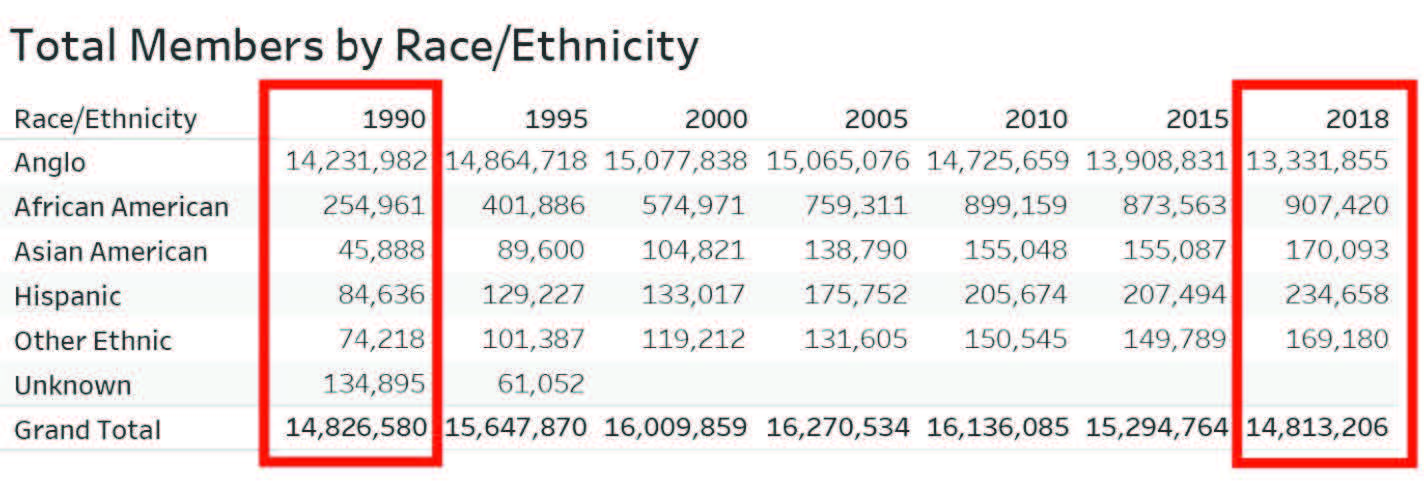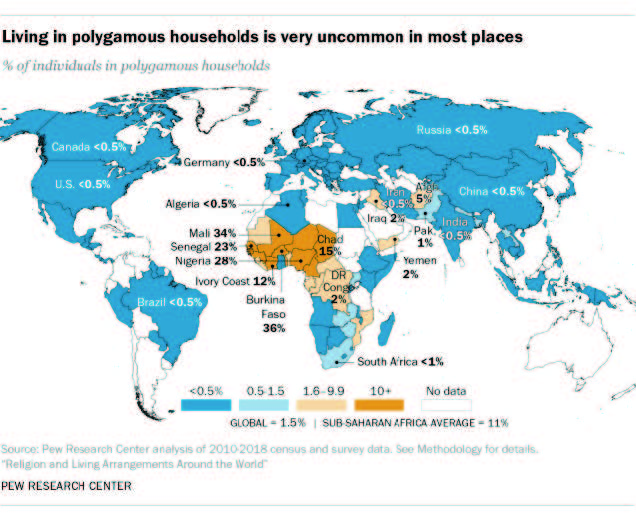
![]() While it is true that the Southern Baptist Convention (SBC) is showing steady membership losses, a study parsing these figures by ethnicity reveals patterns of growth beyond the majority-white members. The study, conducted by the denomination’s International Mission Board, found that while the overall SBC membership decreased slightly by -0.1 percent from 1990 to 2018, ethnic minority groups and congregations increased by more than one million members. Asian American membership increased by more than 270 percent while Anglo membership declined by 6.3 percent during this time. Especially since 2000, the most SBC membership growth occurred among African Americans, Asian Americans, and Hispanics Ronnie Floyd of the SBC Executive Committee writes that, with 22.3 percent of its congregations now being non-Anglo and many worshipping in multiple languages, the SBC may well be the most multi-ethnic and multi-lingual denomination in the U.S.
While it is true that the Southern Baptist Convention (SBC) is showing steady membership losses, a study parsing these figures by ethnicity reveals patterns of growth beyond the majority-white members. The study, conducted by the denomination’s International Mission Board, found that while the overall SBC membership decreased slightly by -0.1 percent from 1990 to 2018, ethnic minority groups and congregations increased by more than one million members. Asian American membership increased by more than 270 percent while Anglo membership declined by 6.3 percent during this time. Especially since 2000, the most SBC membership growth occurred among African Americans, Asian Americans, and Hispanics Ronnie Floyd of the SBC Executive Committee writes that, with 22.3 percent of its congregations now being non-Anglo and many worshipping in multiple languages, the SBC may well be the most multi-ethnic and multi-lingual denomination in the U.S.

![]() Pew Research Center’s Fact Tank blog (December 7) reports that while polygamy is more likely to exist in Muslim-dominated countries, the practice is rare in many of them. Researcher Stephanie Kramer analyzed 2019 Pew data on polygamy and found it clustered in the West and Central African countries of Burkina Faso (36 percent), Mali (34 percent), and Nigeria (28 percent). In these countries polygamy is legal, at least to some extent. Muslims in Africa are more likely than Christians to live in this type of arrangement (25 percent versus 3 percent), but in some countries practitioners are found among adherents of folk religions and those not identifying with a religion. In Burkina Faso, 45 percent of people who practice folk religions, 40 percent of Muslims, and 24 percent of Christians practice polygamy. Chad is the only country where Christians (21 percent) are more likely than Muslims (10 percent) to live in this type of arrangement.
Pew Research Center’s Fact Tank blog (December 7) reports that while polygamy is more likely to exist in Muslim-dominated countries, the practice is rare in many of them. Researcher Stephanie Kramer analyzed 2019 Pew data on polygamy and found it clustered in the West and Central African countries of Burkina Faso (36 percent), Mali (34 percent), and Nigeria (28 percent). In these countries polygamy is legal, at least to some extent. Muslims in Africa are more likely than Christians to live in this type of arrangement (25 percent versus 3 percent), but in some countries practitioners are found among adherents of folk religions and those not identifying with a religion. In Burkina Faso, 45 percent of people who practice folk religions, 40 percent of Muslims, and 24 percent of Christians practice polygamy. Chad is the only country where Christians (21 percent) are more likely than Muslims (10 percent) to live in this type of arrangement.
But in many Muslim-majority countries permitting polygamy, the actual practice is rare. Less than one percent of Muslim men live with more than one wife in Afghanistan, Pakistan, Bangladesh, Iran, and Egypt—all countries where the practice is legal, at least for Muslims Polygamy is also legal in Saudi Arabia, Qatar, the United Arab Emirates and other neighboring countries, but Kramer had limited data on them. She also found religion to have an impact on

how polygamy is permitted and practiced. Polygamous arrangements are not allowed at the federal level in Nigeria, but the prohibition only applies to civil marriages. Twelve northern, Muslim-majority states in the country do sanction these unions as Islamic or customary marriages. In India, Muslim men are allowed to practice polygamy, while men of other faiths are not. However, in countries where polygamy is common, it often is practiced by people of all faiths, as is the case in Gambia, Niger, Mali, Chad, and Burkina Faso. Meanwhile, Kramer cited a recent Gallup poll finding that 20 percent of American adults believe that polygamy is morally acceptable. This acceptance rate has almost tripled (from 7 percent) since the question was first posed in 2003, though it is still among the behaviors that are least accepted.
(Pew Fact Tank, https://www.pewresearch.org/fact-tank/2020/12/07/polygamy-is-rare-aroundthe-world-and-mostly-confined-to-a-few-regions/)